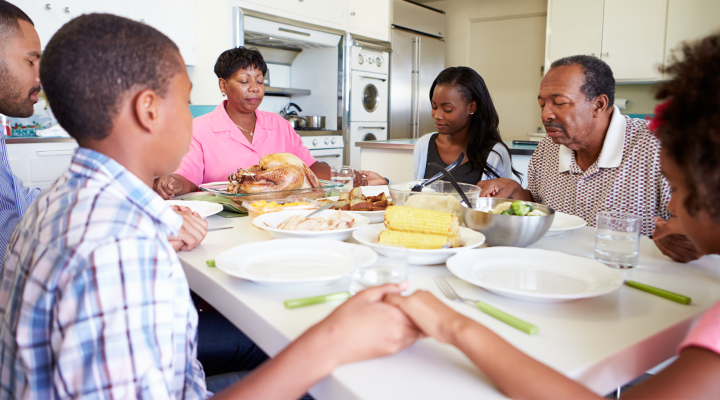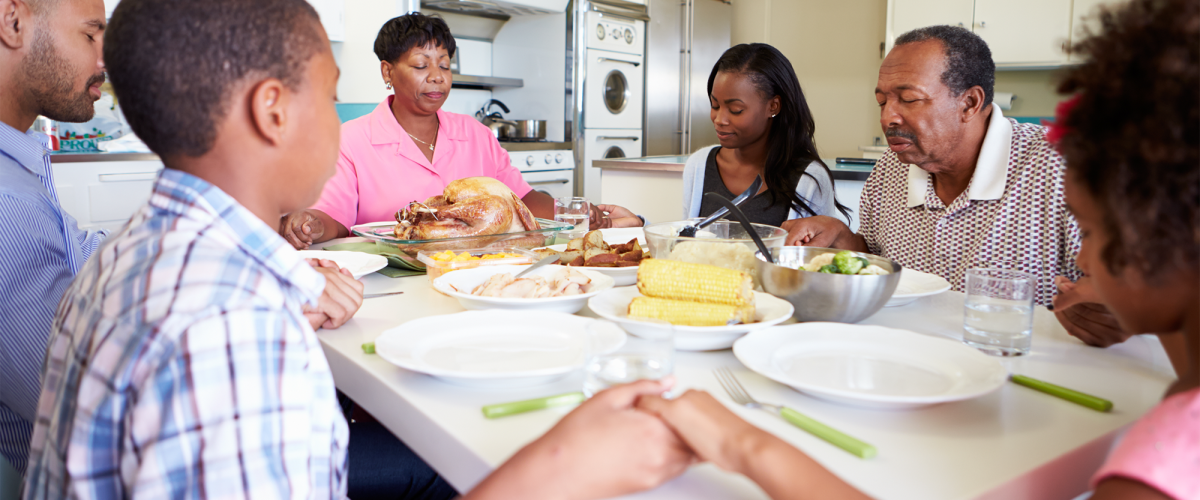As we enter October, the holiday season is coming up quickly. Halloween, Thanksgiving, Christmas. Most of these holidays entail some sort of celebration that involves food. Even if you are not celebrating a specific holiday, this is the time of year when we are planning visits to see our family and friends, where we will surely share meals together.
If you are a Christian, you might say grace before eating. Perhaps you only do it when you are with your family or on special occasions. Or maybe it’s only because that one family member always gets up and prays before anyone is allowed to start scooping mashed potatoes on holidays.
We all know what it means when an aunt or uncle says, “All right, let’s say grace” even if you don’t remember the last time you did it yourself.

Mallory Challis
But what is the importance of saying grace? Why do we waste 30 seconds sitting at the table while the smell of freshly baked casserole sits right in front of us when we could just start eating?
You might think saying grace doesn’t make a difference in how we enjoy our meals, but it does. Here are four reasons why these pre-meal prayers are important.
First, saying grace gives us an opportunity to thank our God for providing the meal. The children’s prayer, “God is great, God is good, let us thank him for our food ” might come to mind here.
It may seem unnecessary to do this — after all, God has provided a meal for us many times. Providing for us should be God’s job. However, thinking like this causes us to lack respect for the privilege we have when we see food on our plates.
Some of us live in abundance, but many of us do not. It is a blessing that we can eat food, especially the foods we want to eat. I cannot remember the last time I missed out on a healthy meal because I could not afford or access it, but many people experience that every single day. We should celebrate the fact that we are blessed with full plates, even if it is just for one evening.
Second, saying grace also allows us to thank the food that is on our plates.
We don’t often look at the sweet potato casserole that grandma made on Thanksgiving and tell it “thank you” before scooping a forkful into our mouths. In fact, your cousins might make fun of you for doing that. But thinking about what is on your plate, how it got on your plate and what its life looked like before it got on your plate is important in our appreciation of food.
“Thinking about what is on your plate, how it got on your plate and what its life looked like before it got on your plate is important in our appreciation of food.”
Think about your sweet potatoes growing in the soil and being picked up by a farm worker to be shipped off to your local grocery store. If you eat meat, consider the cow standing in a pasture feeling a breeze on its face as its farmer walks over with a milk bucket to collect its daily supply. The lives of so many plants and animals make up your plate, and when we say grace, we honor them before partaking in the meal.
Third, saying grace is an opportunity for us to practice patience.
We often fail to nourish ourselves throughout the day and come to the table with stomachs rumbling after we smell the food that has been prepared. I say this from personal experience — I often cannot wait to start eating, especially on holidays like Thanksgiving.
When we feel like this, prayer can seem like an inconvenience. This little ritual gets in the way of our ability to satiate our hunger. In turn, we do not actually focus on the grace that is being given. Instead, we are thinking about what we will scoop onto our plate first and hoping that our favorite aunt made the deviled eggs this year.
Stopping to say grace, even if it is just for thirty seconds, teaches us that to enjoy something, we must first wait. Our eagerness to eat will not make the prayer go by faster, so we might as well listen up and take this time to reflect on what is being called to our attention.
“Stopping to say grace, even if it is just for thirty seconds, teaches us that to enjoy something, we must first wait.”
Finally, saying grace is a practice in gratitude.
Think about it: When we pray over a meal, unless we are alone, everyone at the table stops and collectively sits together in harmony. Some families hold hands, and most families bow their heads. This is a great time to appreciate the fact that you are all sitting in fellowship with one another.
Eating is an inherently communal experience. Even if you are eating alone, there are tons of personalities on your plate, like the sweet potatoes and the cow, or the farmers, grocery workers and truck drivers who helped put them there. If you are eating with a group of people, it is likely a few people brought a dish, drink or dessert for everyone to eat. Pausing before partaking helps us express gratitude for what it takes to bring together this meal. It also helps us appreciate the simple experience of being together while eating.
Mallory Challis is a senior at Wingate University and serves this semester as BNG’s Clemons Fellow.
Related articles:
Mitch Albom: ‘God can answer your prayers sometimes with something that breaks your heart’ | Opinion by Maina Mwaura
Two days with the monks: Protestant envy, confusion and gratitude | Opinion by Brett Younger
Grace and peace to you — at the tip of a sword | Opinion by Mark Wingfield


